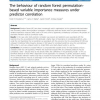Free Online Productivity Tools
i2Speak
i2Symbol
i2OCR
iTex2Img
iWeb2Print
iWeb2Shot
i2Type
iPdf2Split
iPdf2Merge
i2Bopomofo
i2Arabic
i2Style
i2Image
i2PDF
iLatex2Rtf
Sci2ools
126
click to vote
BMCBI
2010
2010
The behaviour of random forest permutation-based variable importance measures under predictor correlation
Background: Random forests (RF) have been increasingly used in applications such as genome-wide association and microarray studies where predictor correlation is frequently observed. Recent works on permutation-based variable importance measures (VIMs) used in RF have come to apparently contradictory conclusions. We present an extended simulation study to synthesize results. Results: In the case when both predictor correlation was present and predictors were associated with the outcome (HA), the unconditional RF VIM attributed a higher share of importance to correlated predictors, while under the null hypothesis that no predictors are associated with the outcome (H0) the unconditional RF VIM was unbiased. Conditional VIMs showed a decrease in VIM values for correlated predictors versus the unconditional VIMs under HA and was unbiased under H0. Scaled VIMs were clearly biased under HA and H0. Conclusions: Unconditional unscaled VIMs are a computationally tractable choice for large data...
| Added | 08 Dec 2010 |
| Updated | 08 Dec 2010 |
| Type | Journal |
| Year | 2010 |
| Where | BMCBI |
| Authors | Kristin K. Nicodemus, James D. Malley, Carolin Strobl, Andreas Ziegler |
Comments (0)

